DHT, or Dihydrotestosterone, might sound like a fancy scientific term, but it’s just a big name for a little hormone that can cause a lot of commotion, especially when it comes to hair loss. It’s formed from testosterone by an enzyme called 5-alpha reductase, and while it plays a role in developing male characteristics, too much DHT is notorious for miniaturizing hair follicles until they can’t grow hair anymore.
Now, why would someone have higher levels of DHT? Well, it’s often not your fault. Some folks are just genetically predisposed to pump out more of it. This genetic link can make DHT levels high enough to jumpstart hair loss right from a young age.
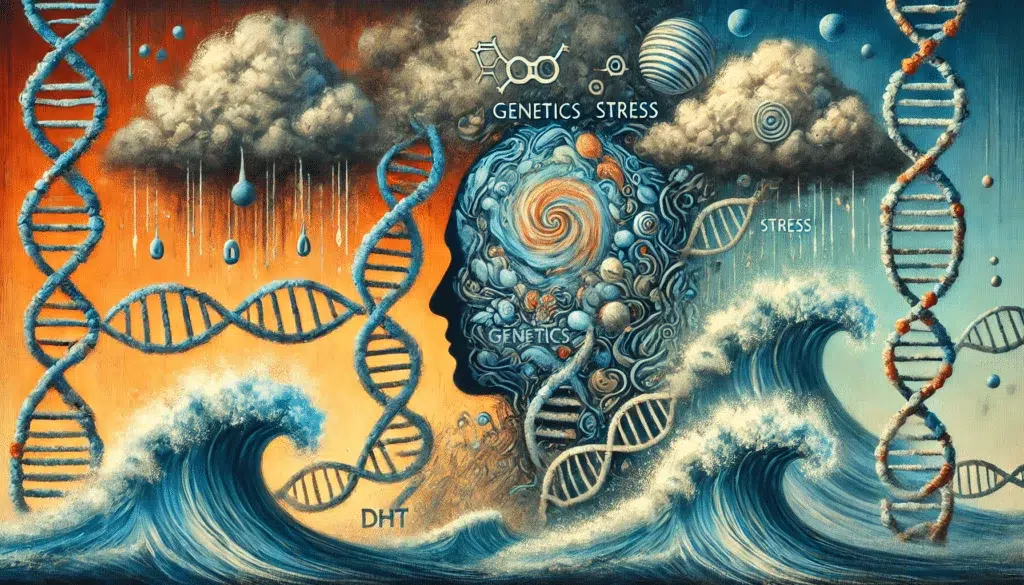
Hormones are another big player. Changes in your hormones can lead to fluctuations in DHT. We often see this during puberty, pregnancy, or menopause. These times when your body’s doing its hormonal dance can really influence how much DHT is cruising through your sys
Lifestyle habits also chip in. High-stress levels, poor diet, and lack of sleep can throw your hormones off balance, sending DHT levels into overdrive. It’s like your body’s way of telling you to slow down and pay attention to what you’re putting in it.
Who’s most at risk? Men, especially those with a family history of hair loss, are primary targets. But women aren’t immune. Females experiencing hormonal changes, like those during menopause, may also find themselves grappling with excess DHT. So, keeping an eye on these factors early can make a significant difference.
🌿 Addressing DHT Imbalance: A Natural Approach
Reducing DHT naturally isn’t just a dream—it’s absolutely possible with a few smart tweaks to your daily habits. If you’re wondering how to reduce DHT fast, it starts by working with your body, not against it. You don’t need a full life overhaul—just intentional lifestyle upgrades.
🌿 Start with what you can control.
Regular exercise is a powerful hormone balancer. Weight training boosts testosterone efficiency, while yoga lowers cortisol—the stress hormone that can indirectly spike DHT levels. Both forms of movement are among the best natural DHT blockers in terms of lifestyle habits.
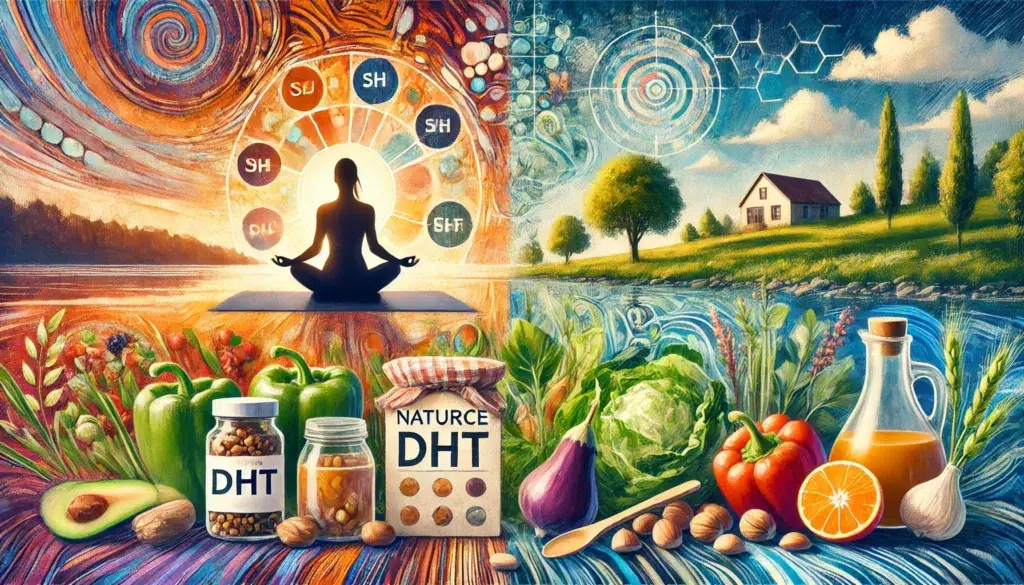
🌿 Upgrade your nutrition.
A DHT-friendly diet is rich in zinc, lysine, and antioxidants. Think nuts, seeds, and leafy greens. These nutrients help your body regulate hormone production and reduce DHT naturally over time. No extreme restrictions—just smarter choices that stack up.
🌿 Master your stress.
Mindfulness, meditation, or even a daily nature walk can significantly reduce cortisol and stabilize hormone output. Chronic stress is one of the most underrated causes of hormonal chaos, so calming your nervous system is key.
🌿 Think holistically.
Instead of obsessing only about DHT, embrace a mindset that prioritizes your full-body health. This approach supports your scalp, follicles, and mental clarity all at once. Because when you feel good inside, it shows on the outside too—especially in your hair.
🧠 Pro tip: Even small actions done consistently—like a 15-min walk, daily green smoothie, or journaling before bed—can shift your hormonal terrain for the better.
🌿 Nature’s Remedies: Foods and Vitamins to Block DHT
Changing what you put on your plate can be a true game-changer when trying to reduce DHT naturally. In fact, some of the best natural DHT blockers are probably already in your kitchen—if you know where to look
🌿 Start with lycopene-rich foods like tomatoes and watermelon.
These vibrant fruits are loaded with antioxidants that help block the enzyme 5-alpha reductase, which is responsible for converting testosterone into DHT. Even a simple tomato salad could help reduce DHT levels—and support healthier hair in the long run.
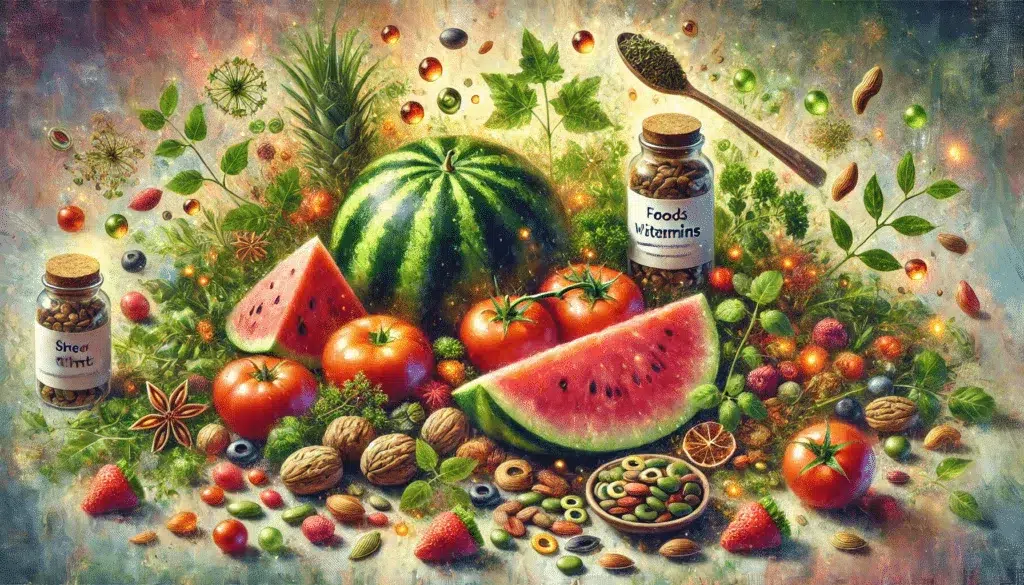
🌿 Snack smart with nuts and seeds.
Almonds, walnuts, flaxseeds, and chia seeds are rich in zinc and omega-3 fatty acids, two key nutrients for hormonal balance and hair health. These natural oils help your body defend against DHT buildup in the scalp.
🌿 Trust in time-tested herbs like saw palmetto and green tea.
They’re not just old remedies. According to a recent DHT and hair loss study, these herbs actively inhibit DHT production and may slow down the miniaturization of hair follicles
💊 Don’t forget the vitamin squad.
Biotin is the MVP here. Known for strengthening hair from the inside out, you’ll find it in foods like eggs, sweet potatoes, and spinach—or in well-formulated supplements. Bonus points if your multivitamin also contains zinc, B-complex, and magnesium.
🌿 Make it work for you.
Craft a simple weekly meal plan built around these anti-DHT foods. It doesn’t need to be complicated—just consistent. And remember, what you eat today can influence how your hair looks in six months. 🥦
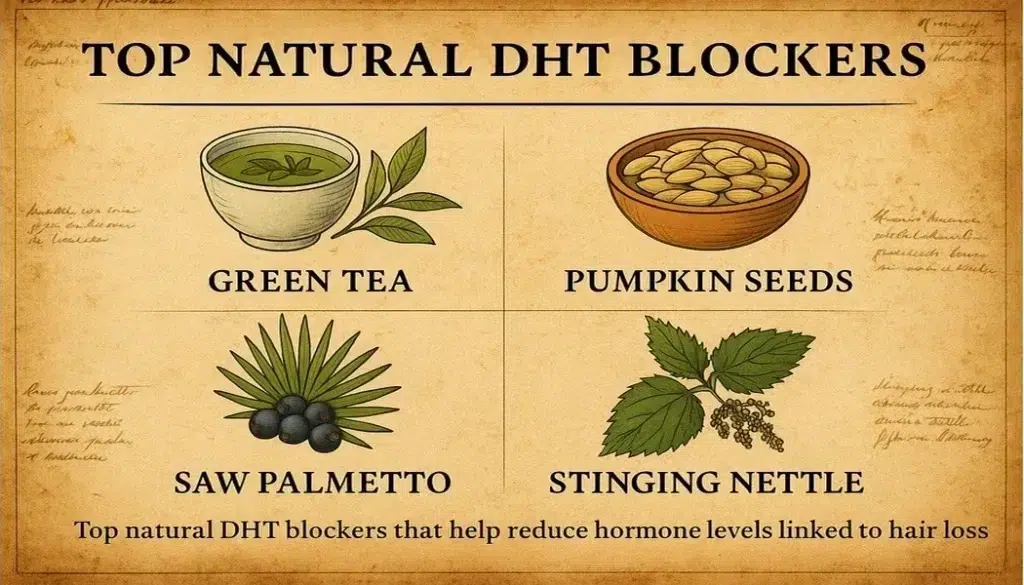
💊🧠 Scientific Advancements and Holistic Approach Synergy
The good news? Science is rapidly advancing in the battle against hair loss—and DHT-blocking innovations are at the center of it all. 💊
Recent breakthroughs in pharmacology have led to the development of medications specifically designed to inhibit 5-alpha reductase, the enzyme that triggers DHT production. When used correctly, these treatments can reduce DHT fast and effectively—especially when they’re not used in isolation.
But here’s the game-changer: 🌿 Integrating natural methods with modern medicine leads to far better outcomes. A holistic strategy that combines nutrition, herbal supplements, physical activity, and stress management supports your body’s ability to maintain hormonal balance, complementing pharmacological efforts
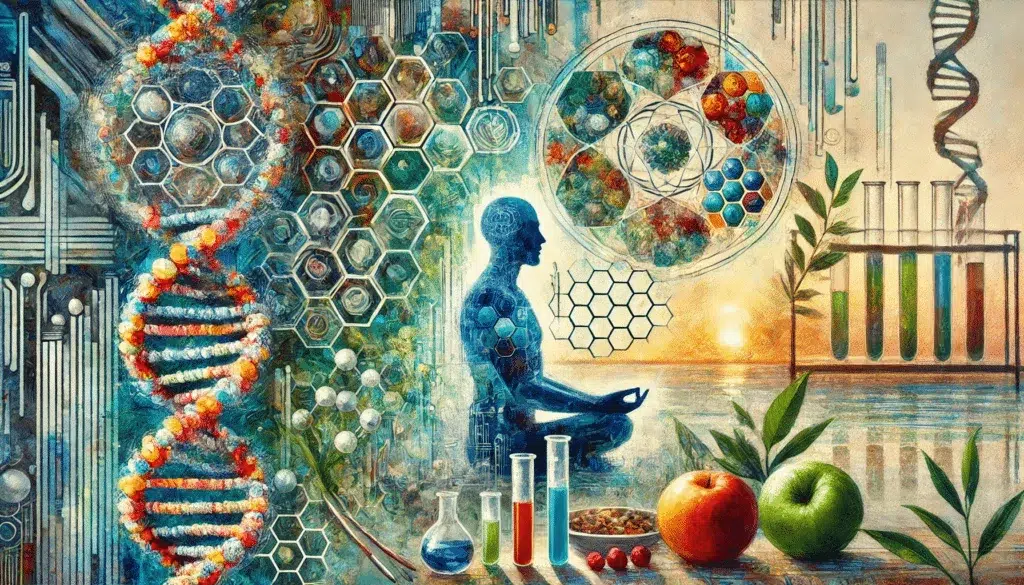
This synergy between science and lifestyle is what turns short-term fixes into long-term solutions. Real-world success stories show that people who take this multi-faceted approach often notice not only less hair shedding—but better energy, clearer skin, improved sleep, and a stronger sense of control over their health.
And the future? 🔬 Looking bright.
New DHT and hair loss studies are regularly being published, exploring everything from plant-based inhibitors to gene therapy. Staying up-to-date on these findings gives you the power to adapt and optimize your routine over time.
🧠 Whether you’re using finasteride, saw palmetto, green tea, or all of the above—it’s the combination that counts. No one method wins alone. Your success lies in how they work together.
Stay with us — the best is yet to come.
By following our advice, you’re doing the most you can for your hair.
Be the first to know when we publish new guides, tests, and proven strategies for stronger, healthier hair.
👉 Visit the About Me page to learn more about my journey, mission, and why helping people with hair health is so personal to me.
Want healthier, stronger hair? Discover 8 science-backed habits that protect your scalp and boost natural growth. Get your free PDF guide today!
Disclaimer: This article is for informational purposes only and is not a substitute for professional medical advice. Sensitive claims are supported with scientific references, and full product details can always be found on the official websites of the respective manufacturers or distributors.
Some links in this article are affiliate links. If you choose to make a purchase through them, I may earn a small commission at no extra cost to you — helping me keep HairGrowGenius running. Thank you for your support!

🧠 FAQ – Reducing DHT Naturally for Hair Loss Prevention
🧪 What is DHT and how does it cause hair loss?
DHT (dihydrotestosterone) is a hormone derived from testosterone. In genetically sensitive individuals, it binds to hair follicles and shrinks them over time — a process known as miniaturization. This eventually leads to thinning and hair loss, especially on the crown and hairline.
🌿 What are the most effective natural DHT blockers?
Some of the top natural options include saw palmetto, pumpkin seed oil, nettle root extract, green tea, and reishi mushroom. These plant-based ingredients have shown potential in reducing DHT levels or blocking its effects at the follicle level — without the side effects of pharmaceuticals.
🥦 Can diet and lifestyle changes reduce DHT naturally?
Yes. Eating more zinc-rich foods, healthy fats, and antioxidant-rich vegetables can help regulate DHT. Reducing stress, getting enough sleep, and avoiding sugar spikes may also help by balancing hormones and lowering systemic inflammation.
🧾 Last updated: June 2025 based on latest research


Leave a Reply